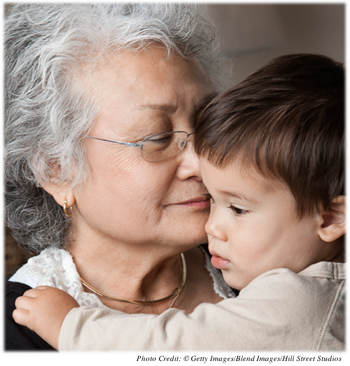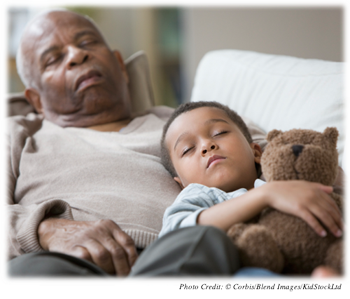Grandparents as Parents
Slide 1 of 9: Synopsis

Author
Catherine Robertson, Grossmont College
Pamela Hill, San Antonio College
Synopsis
The percentage of grandparent caregivers is growing. In video clips, grandparents, grandchildren, and experts explain the impact of grandparents becoming primary caretakers to their grandchildren and how this caretaking role interacts with the physical, cognitive, psychological, and economic aspects of older adulthood.
References
Census Bureau Reports 64 percent increase in number of children living with a grandparent over last two decades. (2011, June 29). Newsroom. US Census Bureau. Retrieved at http://www.census.gov/newsroom/releases/archives/children/cb11-117.html
Family Structure. (2011). Child trends. Retrieved at http://www.childtrendsdatabank.org/?q=node/334
ChildTrend Calculations of US Census Bureau, Current Population Survey, 2011. American families and living arrangements 2010, Table C-2. US Census Bureau. Retrieved at http://www.census.gov/population/www/socdemo/hh-fam/cos2010.html
Fields, J. (2003, June). Children’s living arrangements and characteristics: March 2002. Current Population Reports, P20-547. US Census Bureau. Retrieved at http://www.census.gov/prod/2003pubs/p20-547.pdf
Kreider, R. & Ellis, R. (2011, June). Living arrangements of children: 2009. Household Economic Studies, P70-126. US Census Bureau. Retrieved at http://www.census.gov/prod/2011pubs/p70-126.pdf
MetLife Mature Market Institute in collaboration with Peter Francese. (2011). The MetLife Report on American Grandparents: New Insights for a New Generation of Grandparents. Westport, CT: Author. Retrieved at https://www.metlife.com/mmi/research/american-grandparents-insights-new-grandparents.html#findings
Simmons, T. & Dye, J. L. (2003, October). Grandparents living with grandchildren: 2000. US Census Bureau Census 2000 Brief, C2KBR-31. Retrieved at http://www.census.gov/prod/2003pubs/c2kbr-31.pdf
U.S. Department of Commerce. (July 31, 2012). Grandparents Day 2012: Sept. 9, U.S. Census Bureau News: Profile America Facts for Features (CB12-FF.17). Retrieved at http://factfinder2.census.gov
Slide 2 of 9: Grandparent-Headed Households
- Chapters
- descriptions off, selected
- captions settings, opens captions settings dialog
- captions off, selected
- English Captions
This is a modal window.
Beginning of dialog window. Escape will cancel and close the window.
End of dialog window.
This is a modal window. This modal can be closed by pressing the Escape key or activating the close button.
This is a modal window.
In 2010, 2.7 million American grandparents were responsible for the basic needs, such as food, shelter, and clothing, of one or more of their grandchildren living with them. At a time when older adults look forward to relaxing in their later years, a growing number of grandparents are actually acting as daily caregivers for their grandchildren. Many of these grandparent caregivers live with one of their adult children and may help to care for their grandchildren. Other grandparent caregivers maintain their own households where they live with their grandchildren and sometimes one or both of their grandchildren’s parents.
Based on 2010 census data, it can be estimated that one out of every three U.S. households (for a total of 39.8 million families) was headed by a grandmother, a grandfather, or both. Furthermore, an estimated 4.5 million grandparent-headed households (approximately 11 percent of all grandparent-headed households) contain one or more grandchildren. Approximately 1.5 million households, or one-third of these grandparent-headed households with one or more grandchildren, include neither biological parent of the grandchild or grandchildren. These households headed by grandparents are named skipped generation households because of the absent parents. Parents may be unable to live with their children for a variety of reasons, such as military deployment, relocation because of job or loss of employment, loss of custody, teen or unwanted pregnancy, physical or mental illness, drug or alcohol abuse, incarceration, or even death.
Play the video to hear Anna Zimmer, a gerontological social worker, and other adults discuss family situations in which grandparents act as parents.
Slide 3 of 9: Grandparent Caregivers and Economics

Grandparent caregivers in skipped generation households tend to have clear economic challenges and often need outside financial assistance. As of 2010 in the United States, the average income for grandparent-headed households in which no parent of the grandchildren was present was approximately $33,000. While this income was above the U.S. poverty level, this income would still likely be a strain for grandparent caregivers to cover the cost of housing, food, clothing, health care, and any other basic living expenses for themselves and even one grandchild. In many cases, financial difficulties are apt to accompany grandparent caregiving in a skipped generation household.
The economic demands of grandparents being their grandchildren’s primary caregivers are further compounded by other socioeconomic statistics. For example, while many grandchildren are raised by both the grandmother and grandfather, there are a growing number of single grandmothers who have full responsibility for their grandchildren without any parental help. Statistically, single grandmother caregivers are more likely to be poor, facing economic hardship, and either black or Hispanic. Some states may provide grandparent caregivers with foster care or kinship care payments. However, some grandparents may be unable to supplement these payments with paid work if they are elderly or disabled. Others might be unaware of the availability of kinship care payments. Furthermore, grandparents may have made housing and financial decisions based on the fact that they have no more children to support, so they may have already begun to spend their money based on their independence. There are many scenarios that may make grandparents less than economically ideal to become primary caregivers to their grandchildren.
Slide 4 of 9: Other Factors Affecting Grandparent Parenting
- Chapters
- descriptions off, selected
- captions settings, opens captions settings dialog
- captions off, selected
- English Captions
This is a modal window.
Beginning of dialog window. Escape will cancel and close the window.
End of dialog window.
This is a modal window. This modal can be closed by pressing the Escape key or activating the close button.
This is a modal window.
While grandparents may gain from parenting a second time around, grandparent caregivers often sacrifice much as they take on the responsibility of providing for their grandchildren. An elevated stress level may affect the health and well-being of an aging grandparent especially if the stress is long-term. The experience of parenting for grandparents may be influenced by a number of different factors such as, the culture of the particular family structure, ages of grandparents, marital status of grandparents, physical and mental health of grandparents or grandchildren, housing and general living costs, support structure available to the grandparents, and involvement of the grandchildren’s biological parents.
Slide 5 of 9: The Effects of Having Grandparents as Parents on Grandchildren
- Chapters
- descriptions off, selected
- captions settings, opens captions settings dialog
- captions off, selected
- English Captions
This is a modal window.
Beginning of dialog window. Escape will cancel and close the window.
End of dialog window.
This is a modal window. This modal can be closed by pressing the Escape key or activating the close button.
This is a modal window.
Children living in their grandparent’s household without a parent present are at a distinct economic disadvantage as they are often stretching their grandparent’s financial and personal resources. Some grandchildren are likely to need a great deal of hands-on care. The need for such intense involvement may arise from prenatal exposure to drugs, abuse or neglect, poverty, or some other difficulty that prompted grandparents to step in and help. For the grandparents involved, this intensity of care can present added stress. Unfortunately, grandchildren may suffer from this stressful environment as well especially if they have already experienced a traumatic reason for losing their biological parents. In spite of these challenges, grandparents are generally lifesavers because they can offer stability, security, and guidance to grandchildren who may be coming from troubled, unhappy homes.
Slide 6 of 9: Assessment: Check Your Understanding

Slide 7 of 9: Assessment: Check Your Understanding

Slide 8 of 9: Assessment: Check Your Understanding

Slide 9 of 9: Assessment: Check Your Understanding

Congratulations! You have completed this activity.Total Score: x out of x points (x%) You have received a provisional score for your essay answers, which have been submitted to your instructor.